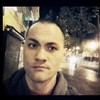
I was so sick and tired of PTSD, and everything about it. I was sick of hearing about it, sick of talking about it, sick of people asking me about it, and I'm sick of being viewed as someone with it. It's totally played.
After some confusion by the audience on whether it would be appropriate to applaud, I got up from my seat and situated myself behind the podium. I took another deep breath and exhaled. Having recited it so many times before, I gave a little speech from memory about how and why I enlisted shortly after 9/11. I talked about how I was actually in New York City, blocks away from the towers falling, how it affected me, and the decisions I chose to make with my life afterwards. My time at Fort Benning, from there assigned to an Infantry unit at Fort Lewis and how we flew into Kuwait, from there driving up into Iraq in 2003 to 2004, where we conducted countless combat operations for nearly a year. As I was talking about the specific types of missions we conducted— raids, ambushes, counter mortar attacks, movement-to-contact patrols—a part of me felt as though I was on exhibit, like a zoo animal, especially with everyone just seated there staring at me blankly, but I brushed it off, telling myself it was just paranoia.With her head cocked slightly to the side, she sweetly asked, 'How old are you?'
Moving on, I looked around the room for another question, praying to God for it to be military- or war-related. While scanning the audience, I noticed a kid seated with his headphones still on bobbing his head. A question came from a student seated in the far back, and who I could tell by the tone of his voice loved weed. "Dude, what was like, the most messed-up stuff you guys did over there?""Excuse me?""You know, like, what's the most f'ed up thing you guys did to someone or saw while over there?""I'm sorry," I answered, knowing what he was getting at. Something that has always irked me is that these people want to hear war stories from you. It's porn to them. The more fucked up the war story is, the more of a hard-on they get. Then they nut and go about their everyday life while you carry the scars of what you saw and did. I don't give handjobs.Something that has always irked me is that these people want to hear war stories from you. It's porn to them. The more fucked up the war story is, the more of a hard-on they get.
The author in Iraq in 2003
Focusing my attention back to the auditorium, I glanced the room as an awkward silence set in. They had become very obviously bored.What in the hell was going on? Was this because I didn't have any cool war stories to share with them? Did they all just figure that I must not have seen any combat? Did they view me as some kind of POG? I hoped to God not. A POG is a term in military language that meant "Person Other than a Grunt," a highly derogatory term used by grunts to reference all those rear-echelon motherfuckers who worked non-infantry jobs.Resisting the urge not to laugh—or cry—I did my best to explain.
